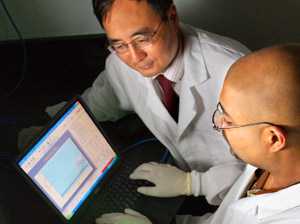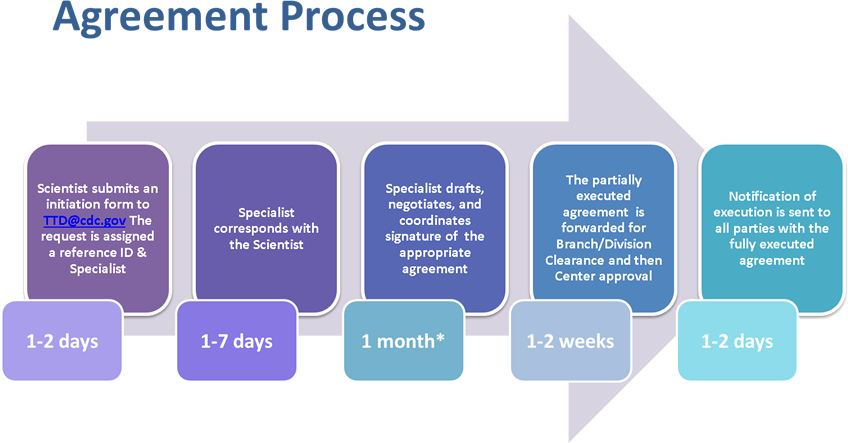Collaboration Opportunities

How to Set Up a Collaboration
The Technology Transfer Office (TTO) serves as the subject matter experts for assisting CDC researchers to establish research relationships with outside parties. Since no collaborative research project is the same, TTO offers various agreements that are drafted to fit your research needs. To begin a collaborative research project, CDC scientists should please fill out an Initiation Form and contact TTO at ttd@cdc.gov for assistance.

*This time frame is an average. The negotiation time may vary based on the agreement type, complexity, and external partners. Note that the number of days refers to business days.
Types of Collaboration Opportunities
Material Transfer Agreement (MTA)
MTAs are agreements used when proprietary material is exchanged between parties. This formal agreement defines the terms and conditions under which the recipient may use the materials provided. Rights in intellectual property (IP) or rights for commercial purposes cannot be granted under this agreement in advance. To ensure IP ownership is maintained, MTAs must be executed before materials are sent or received by CDC researchers.
Confidentiality Agreement (CDA)
Confidentiality agreements are contracts used when a party has confidential proprietary information that is shared with another party. The interested party might need to examine the information in order to assess the possibility of future collaborations.
Research Collaboration Agreement (RCA)
This collaborative agreement is used for the exchange of material and confidential information intended for use in a mutual research project. RCAs outline what material or expertise each entity will bring to the project and delineate who is responsible for certain portions of the research. When proprietary rights are involved in these agreements, each party agrees to retain the title to any intellectual property made by its employees.
Cooperative Research and Development Agreement (CRADA)
CRADAs provide an opportunity for CDC investigators to work with colleagues in industry or academia on common research goals. The purpose of a CRADA is to make government facilities, intellectual property, and expertise available for collaboration to further the development of commercialized products that meet a public health need. CRADAs offer collaborators an option to license any CDC developed intellectual property that results from the agreement. CDC may provide research personnel, laboratory facilities, materials, equipment, supplies, or other in-kind contributions to the collaborator. However, CDC cannot provide funding to the collaborator in this agreement. The collaborator may provide research personnel, laboratory facilities, materials, equipment, supplies, other in-kind contributions and funding to cover added costs associated with hiring personnel to work on the CRADA research project.
- Page last reviewed: June 29, 2017
- Page last updated: October 13, 2016
- Content source:
- Office of the Associate Director for Science


 ShareCompartir
ShareCompartir